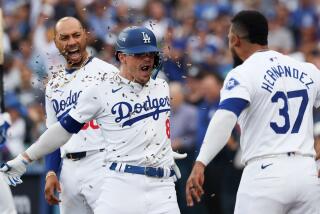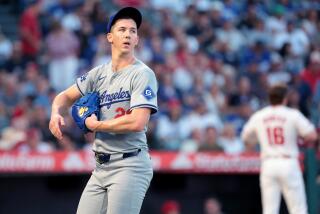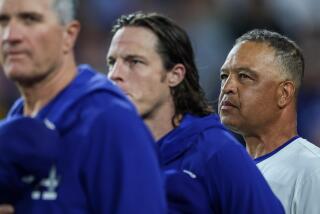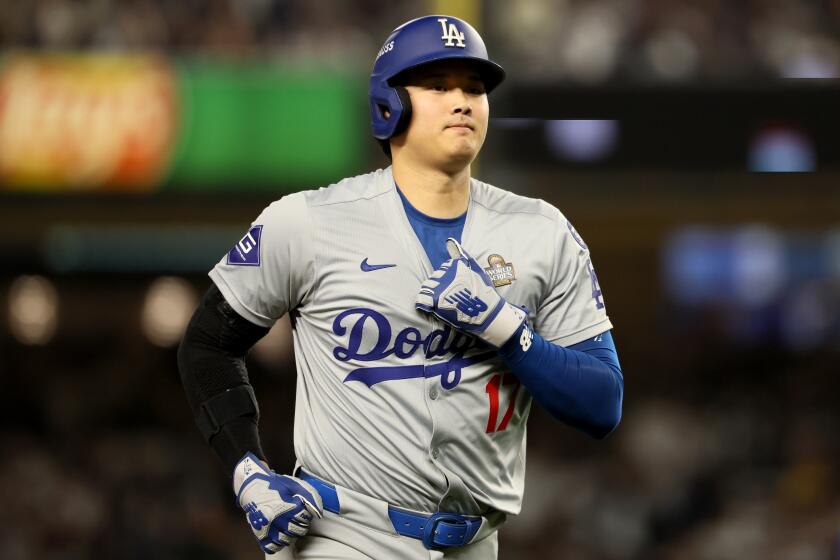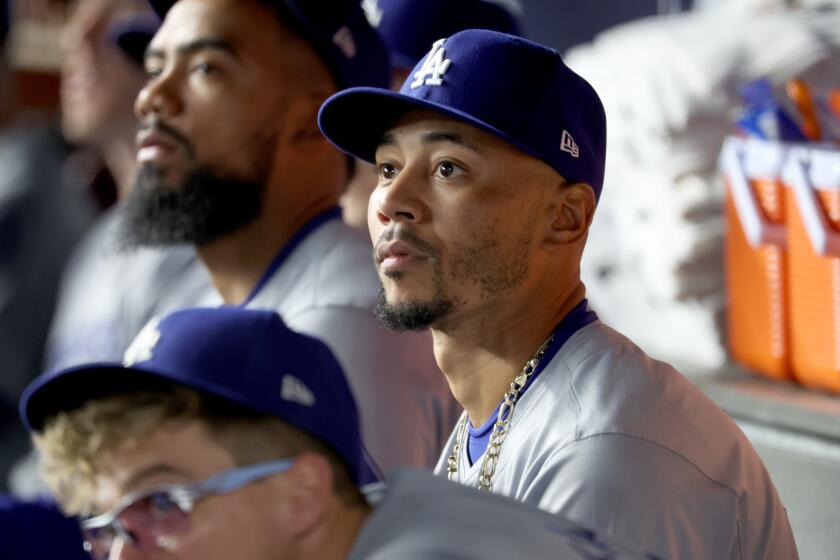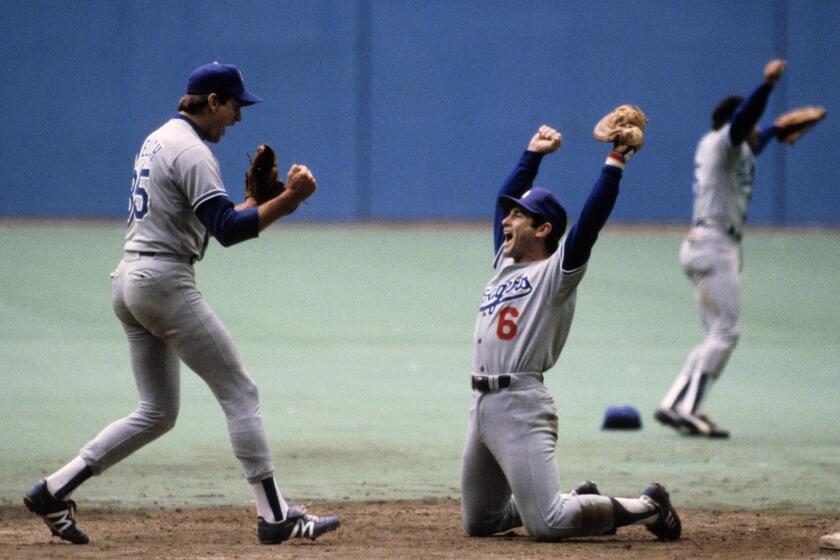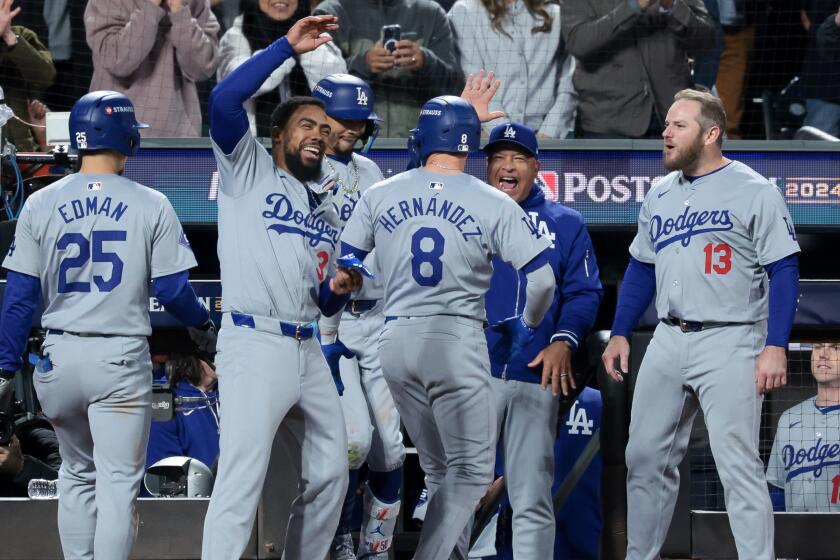Benchwarmer Has Unique Relief Role for Dodgers
During spring training in the 1960s, Washington Senator Manager Gil Hodges spotted four players ducking out of the team hotel past curfew, although they did not see him. Next day at the clubhouse meeting, Hodges announced $50 fines against each player, saying, “I won’t embarrass you by naming names, but you know who you are. Give your check to (coach) Joe Pignatano. If I have to come to you tomorrow and ask for your fine, it’ll cost you $100.”
Later that day, Pignatano told Hodges, “You know those four guys you fined this morning? Well, seven of them have paid the fine already.”
From 1903 to 1907, Ossee Schreckengost was more than a catcher for the Philadelphia A’s. He was “big brother” to the team’s talented but wayward pitcher, Rube Waddell. One morning, Waddell woke up in a hospital, bruised and suffering from a slight concussion.
“The last thing I remember was having a few drinks in our hotel room,” he said to his friend. “What happened?”
“You decided you could fly and went out the window,” Ossee replied.
“I could have been killed--why didn’t you stop me?” Waddell shot back.
“What!” said Ossee. “And lose the $100 bucks I bet that you could do it?”
Bugs Raymond (1904-1911) was reputed as one of the major leagues’ all-time elbow-benders, a nocturnal animal who foraged in nightspots and cabarets looking for a good time.
Bugs was closing a Manhattan nightclub when a waiter asked how he threw his spitball. Bugs gripped a water glass and said, “Well, I wet these two fingers, throw my leg up, and go like this.” He threw the glass tumbler through a window. “Note,” he said with a straight face, “the break.”
Bugs played for Manager John McGraw of the New York Giants, who had suspended him more than once for his off-the-field antics. Eventually, McGraw figured to end his pitcher’s escapades permanently by sending Raymond’s salary directly to his wife.
But Bugs came up with a scheme of his own, telling McGraw he needed money to buy underwear and shirts. McGraw, figuring if he gave Bugs cash it would end up in a Broadway taproom, sent one of the coaches along to a haberdashery, and the coach paid the bill. Two hours later, Bugs returned to the store alone and told the clerk that his wife did not like anything he had bought.
“Give me back the $25 and she will be around tomorrow to buy what she likes,” he said.
The clerk complied. Bugs wasn’t seen for three days, but when McGraw’s emissary finally found him at a marathon party, he pleaded, “McGraw needs you badly, and he told me to tell you it’s your turn to pitch today.”
“Nothing doing,” said Bugs.
“What do you mean, ‘Nothing doing?’ ” the messenger appealed.
“Just this: Since McGraw is sending my salary to my wife, let her pitch for him.”
--The Baseball Hall of Shame 4 (c) 1990, Bruce Nash and Allan Zullo productions.
In the celestial garden where Rube Waddell and Bugs Raymond are surrounded by angels (not hailing from California), the former earthly curmudgeons are, predictably, retelling baseball yarns when a new arrival is announced, bringing the latest baseball news from Earth.
“Hold on to your sneakers and red stockings,” he says. “Believe it or not, the Los Angeles Dodgers have hired, yes, have hired a full-time psychiatrist.
“It’s a player benefit,” the new arrival reports as Rube and Bugs look at one another in disbelief.
“A whaaaat?” the two baseball rogues scoff, puzzled looks on their faces.
--A Fan, 1990
Baseball lore is rich with tales of its mischievous, fun-loving competitors of old, who would live aghast in the new world of multimillion-dollar and multiyear player contracts, arbitration hearings and player strikes.
Add the latest development: On the day the Dodgers signed Darryl Strawberry to play in their outfield for more than $20 million over five years, they “signed”--without fanfare--Hernden Harding, medical director for the Ohio Department of Mental Health for the past 18 months, as their full-time team psychiatrist.
For Harding, this will be a novel challenge. With 250 players in the Dodger organization, including the 24-man major league roster, Harding will help both the “big club” and its eight minor league affiliates.
The Dodgers, he said, view it as an investment. Their reasons are not unlike those given by the late George Allen, then coach of the Washington Redskins, who told a team psychologist he was interviewing: “I have 44 players with 100 problems, none having anything to do with football.”
Harding expects to be busy throughout the summer, helping the minor league players when he isn’t at the club’s home games.
There will be a range of services to provide, he believes.
“I expect to be treating players with major psychiatric interventions as needed--among them hospitalization and medication,” Harding said. “I will be caring for those with drug and alcohol problems, and I will be establishing a referral network of providers so that I will be able to monitor them, and help manage their disorders from a distance.”
In effect, he said, his project will be like an employee-assistance program.
“I expect to help pitchers with performance anxiety, and batters who have difficulty with concentration,” he said.
The Dodgers, he assures, are not expecting him to wave a magic wand and improve batting averages.
“The organization has found that there are psychological problems with players and they want to help them,” he said.
At every level, from the minor leagues, where rosters often are filled by unseasoned players, to the majors, where there are players facing retirement and other adjustments, Harding figures there will be an abundance of work.
“Imagine the 20-year-old from Santo Domingo who has been living in an environment of extreme poverty, where many may not be able to read or write their own language, suddenly thrust into an opportunity to earn millions of dollars in the U.S.,” Harding said. “He faces enormous lifestyle changes and the impact on him as an individual is phenomenal. Clearly, he needs help to adjust.”
Similarly, he said, the player about to retire is cast in a new role outside the limelight. He might need help adjusting. And Dodger owner Peter O’Malley has told him, Harding said, that although the Dodgers would no longer have a financial interest in the retiring player, it will not deter the team from providing services.
“ ‘Once a Dodger, always a Dodger,’ Mr. O’Malley told me,” Harding said. “This is not an organization that would want to suck the marrow. The Dodgers have a reputation of being a sterling organization.”
How will he respond to the needs of major league players?
“The job is still being designed,” he said. “I am not so grandiose to think that my presence is somehow going to change statistics. This is a service for the players. I don’t report to management. Confidentiality is retained.
“But I’ll give an example. If a coach says about a player that he is lazy and not pulling his weight, and I know what’s happening in the player’s family life that causes him (an abnormal level of anxiety), I would tell the coach not to write this player off. But I won’t go into detail. I would never say anything that will lessen the player’s standing in the coach’s or the organization’s eye. Never.
“I attended the Dodgers’ instructional league recently in Phoenix, and my most poignant moment so far occurred when one player said, ‘There is nobody I can talk to about these things. . . . This is a team, not a family, and the support is lacking.’
“Well, this isn’t the coach’s expertise. But I will be working with the coaching staffs about approaches with players. Many coaches are great motivators, but they recognize that you don’t motivate everybody in the same way. When they find they may have a hard time reaching a player, they will want to know alternative ways to work with people. So, I will be providing consultation with staff.”
He said he will be seeing all the players. He will be wearing a uniform and sitting in the dugout in the minors. But he will wear a business suit and will not be in the dugout during major league games.
“There will be nothing stigmatizing about a player talking with me because I’ll be talking with all of them,” Harding said. “And if someone wants to talk with me privately, there will be an office away from the ballpark. There will definitely be no psychotherapy on the diamond.”
Harding believes he will be the second full-time team psychiatrist in the major leagues. To his knowledge, only the New York Mets have one full time. Other teams use various mental-health professionals as needed.
In football, hockey and other sports, psychologists have frequently provided service for the last decade. Such jobs have not typically been filled by psychiatrists, Harding acknowledges.
The idea of hiring a psychiatrist was suggested by O’Malley during a meeting with Frank Jobe, the team’s orthopedic surgeon. Jobe offered to look around, talked with his son, Chris, also a physician and an acquaintance of Harding. Interviews followed and Harding was chosen, although his only remotely related experience has been performance treatment for performing artists.
“Wouldn’t you expect opposing players to heckle and hound you endlessly while you sit on the bench with the players in the minors?” Harding was asked.
“When the Dodgers beat the socks off the other team, let them tease all they want,” he retorted.
More to Read
Are you a true-blue fan?
Get our Dodgers Dugout newsletter for insights, news and much more.
You may occasionally receive promotional content from the Los Angeles Times.
